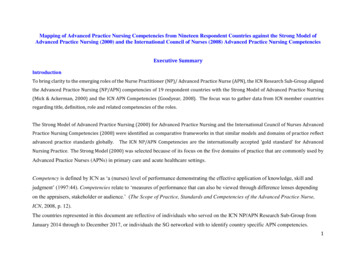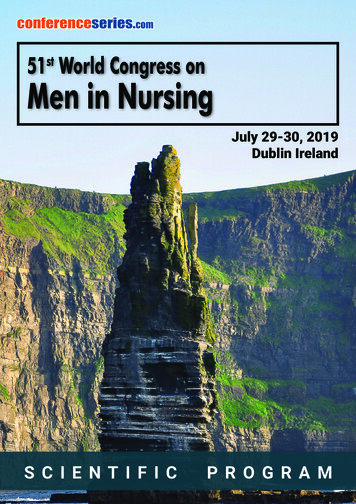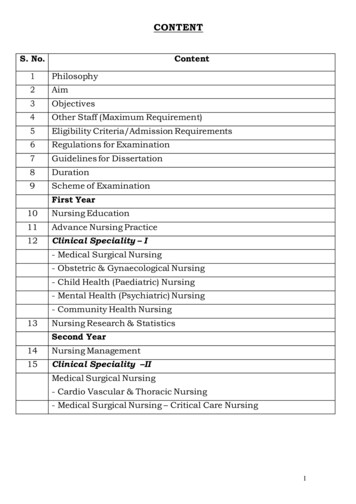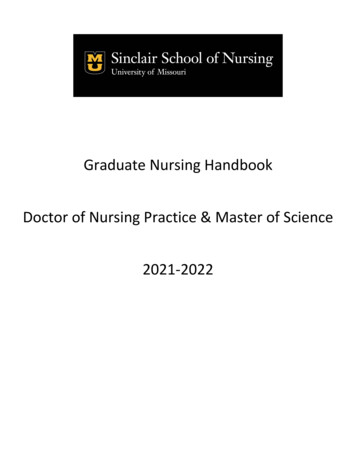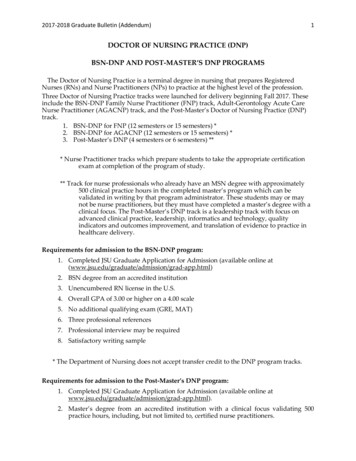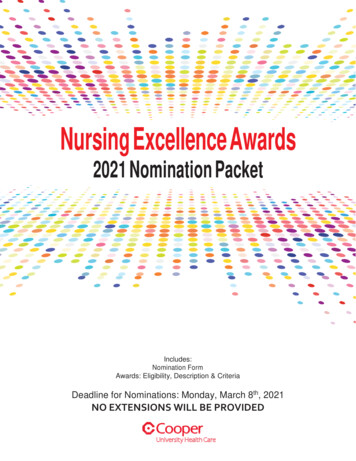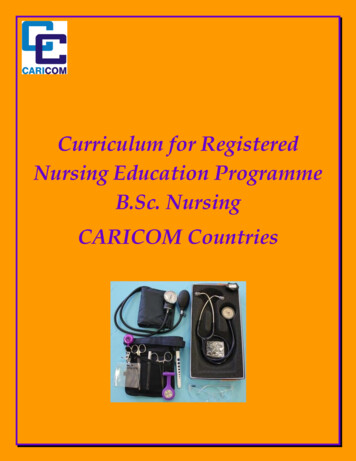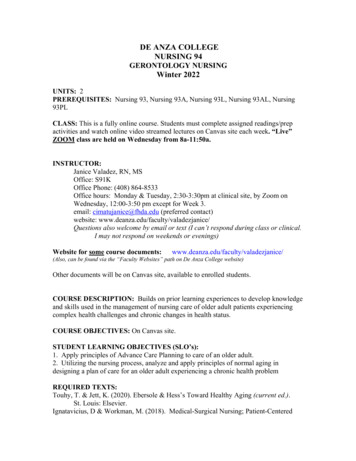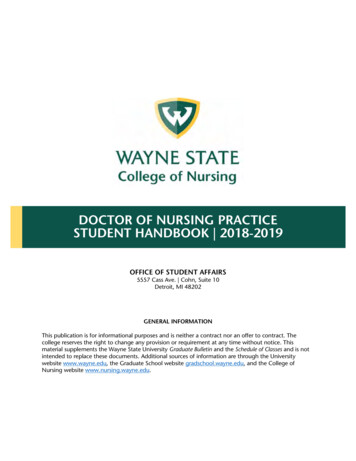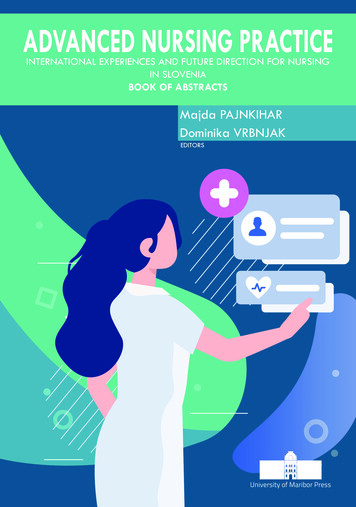
Transcription
Advanced Nursing PracticeInternational Experiences and Future Direction for Nursing in SloveniaBook of AbstractsEditorsMajda PajnkiharDominika VrbnjakJuly 2021
TitleAdvanced Nursing PracticeSubtitleInternational Experiences and Future Direction for Nursing inSlovenia, Book of AbstractsEditorsMajda Pajnkihar(University of Maribor, Faculty of Health Sciences)Dominika Vrbnjak(University of Maribor, Faculty of Health Sciences)Technical editorJan Perša(University of Maribor, University Press)Cover designerJan Perša(University of Maribor, University Press)Cover graphicsNurse, author Megan Rexazin from Pixabay.com CC0ConferenceDate and placeProgramme &organizingcommitteePublished byZaložnikCo-published byIzdajateljEditionPublication typeAvailabe atPublishedFirst conference on Advanced Nursing Practice18th February 2021, Slovenia, OnlineMajda Pajnkihar (University of Maribor, Faculty of Health Sciences),Pamela Jeffries (George Washington University, School of Nursing),Dianne Cooney Miner (St. John Fisher College Rochester, WegmansSchool of Nursing), Hugh Mckenna (Ulster University, School ofNursing), Jozsef Betlehem (University of Pécs, Institute of EmergencyCare), Andras Olah (University of Pécs, Faculty of Health Sciences),Dominika Vrbnjak (University of Maribor, Faculty of Health Sciences),Sonja Šostar Turk (University of Maribor, Faculty of Health Sciences),Gregor Štiglic (University of Maribor, Faculty of Health Sciences),Klavdija Čuček Trifkovič (University of Maribor, Faculty of HealthSciences) & Aleksandra Lovrenčič (University of Maribor, Faculty ofHealth Sciences).University of MariborUniversity PressSlomškov trg 15, 2000 Maribor, Sloveniahttps://press.um.si, zalozba@um.siUniversity of MariborFaculty of Health SciencesŽitna ulica 15, 2000 Maribor, Sloveniahttps://fzv.um.si, p/catalog/book/590Maribor, July 2021
University of Maribor, University Press/ Univerza v Mariboru, Univerzitetna založbaText Authors, Pajnkihar & Vrbnjak, 2021This book is published under a Creative Commons 4.0 International licence (CC BY 4.0). Thislicense lets others remix, tweak, and build upon your work even for commercial purposes, as longas they credit you and license their new creations under the identical terms. This license is oftencompared to “copyleft” free and open source software licenses.Any third-party material in this book is published under the book’s Creative Commons licenceunless indicated otherwise in the credit line to the material. If you would like to reuse any thirdparty material not covered by the book’s Creative Commons licence, you will need to obtainpermission directly from the copyright holder.https://creativecommons.org/licenses/by /4.0/The authors are responsible for linguistic adequacy of abstracts.CIP - Kataložni zapis o publikacijiUniverzitetna knjižnica Maribor616-083(082.2)CONFERENCE of Advanced nursing practice (1 ; 2021 ; online)Advanced nursing practice [Elektronski vir] : practice internationalexperiences and future direction for nursing in Slovenia : book of abstracts :[1st conference of Advanced nursing practice, 28. February 2021, Slovenia] /editors Majda Pajnkihar, Dominika Vrbnjak. - 1st ed. - E-knjiga. - Maribor :Univerza v Mariboru, Univerzitetna založba, 2021Način dostopa (URL): ISBN 978-961-286-499-6 (pdf)doi: 10.18690/978-961-286-499-6COBISS.SI-ID 70651907ISBN978-961-286-499-6 eFree copyFor publisherAttributionprof. dr. Zdravko Kačič, rektor Univerze v MariboruPajnkihar, M. & Vrbnjak, D. (2021). Advanced Nursing Practice:International Experiences and Future Direction for Nursing in Slovenia,Book of Abstracts. Maribor: University Press. doi: 10.18690/978961-286-499-6
ADVANCED NURSING PRACTICE: INTERNATIONAL EXPERIENCESAND FUTURE DIRECTION FOR NURSING IN SLOVENIABOOK OF ABSTRACTSM. Pajnkihar & D. Vrbnjak (eds.)Table of ContentsForewordMajda Pajnkihar1The Advanced Practice Nurse in the USA: Roles, Competencies,Educational Preparation and Scope of PracticePamela R. Jeffries & Joyce Knestrick3Advanced Nurse Practitioners in the UK: Their Selection, Preparation,Education and PracticeHugh McKenna5Advanced Practice in the UK- Addressing the Needs of our PatientsGeraldine Lee7Advanced Nursing Practice in the NetherlandsSigrid CJM Vervoort9The Development for Nurses in Special RolesJozsef Betlehem11The Case for Advanced Practice: Transforming Graduate NursingEducation in the United StatesDianne Cooney Miner13'The Challenge for Advanced Practice in a Covid World'John Wells15Implications of Demographic and Technological Changes for HealthSystem and the Growing Role of NursesEva Helena Zver17Challenges of further development of advanced nursing practice in thecovid-19 post-epidemic eraTit Albreht19Presentation of newly developed model for ANP education in Sloveniaand UM FHS study fields Integrated treatment of chronic patients inadvanced nursing practice, Integrated care for older people inadvanced nursing practice and Mental health in advanced nursingpracticeMajda Pajnkihar & Dominika Vrbnjak21
ADVANCED NURSING PRACTICE: INTERNATIONAL EXPERIENCESAND FUTURE DIRECTION FOR NURSING IN SLOVENIABOOK OF ABSTRACTSM. Pajnkihar & D. Vrbnjak (eds.)ForewordMAJDA PAJNKIHARHonourable and esteemed colleagues, lecturers and participants!It is my honour to welcome you to the first international conference on advancedknowledge in the field of nursing in Slovenia.I am very proud to introduce and start a broader discussion with you on the neweducational model for advanced nursing practice. And on promoting advancedknowledge of nurses in Slovenia. By all means, the new profile of nurses at theMaster degree level of education brings a broad palette of shifting roles andexpanded competencies for nurses in their patients' treatment.Probably the most challenging step of all will be to reach a broader social andprofessional understanding and acceptance of this concept and place a higher valueon nurses in our still very traditional system, model and perception of health care.
2ADVANCED NURSING PRACTICE.Nurses are at the core of the health and wellbeing of patients. Their professionalcontribution to the holistic and high-quality treatment of patients is essential andimmeasurable. This needs to be recognised, this needs to be valued, and this needsto be promoted. We need to reach a shift in the current doctor-centred approachand perception of patient care. And this is not only for the sake of nurses themselves.A highly educated nurse can be of enormous value and support both to the doctorand the patient. The sooner this is recognised, the better our health care systems willbe.The idea, encouragement and enormous help in the development of nursingeducation with advanced knowledge was given to us by the deans and colleaguesfrom the United States, Hungary, Ireland and the UK.The establishment of the education was supported by esteemed and honourablecolleagues from the fields of medicine, health care and other disciplines from acrossSlovenia.Yet, no success would have been possible without the tremendous work and effortsof our faculty staff. Without the support of our university's leadership and team,which made it possible for us to enrol the first generation of excellent studentsalready, all of this would have remained only a wish and an idea. For this, I amenormously grateful to all of them.If there would be one thing I would wish for the end of my work as Dean – followingour strong joint efforts both with colleagues in Slovenia and internationally – it isfor this concept and more significant role and value of the nurses in our society tofully take hold.I hope and wish that the conference, with lectures and a demonstration of severaldecades of international experience, will lay the foundation for nurses' further careerdevelopment. The new profile of nurses will contribute to the safety, care andefficiency of patient care, and this is the essence of what we are striving for.
ADVANCED NURSING PRACTICE: INTERNATIONAL EXPERIENCESAND FUTURE DIRECTION FOR NURSING IN SLOVENIABOOK OF ABSTRACTSM. Pajnkihar & D. Vrbnjak (eds.)The Advanced Practice Nurse in theUSA: Roles, Competencies,Educational Preparation andScope of PracticePAMELA R. JEFFRIES & JOYCE KNESTRICKGeorge Washington University, School of Nursing, Washington, United States of AmericaE-mail: pjeffries@email.gwu.edu, jknestrick77@email.gwu.eduHistorically, due to the complexity and variety of levels of ordinance of practice fornurse practitioners in the United States, the way nurse practitioners functioned wasinconsistent state-to-state or from institution-to-institution. However, in the early2000’s, stakeholders from each of the advanced practice registered nurse (APRN)organizations in the United States partnered to create a uniform regulatory modelpertaining to legislation, accreditation, certification and education, hence theConsensus Model for APRN Regulation (APRN Consensus Work Group, 2008).Implementation of this model is now underway in all 50 states. There are currentlyfour APRN roles including the certified registered nurse anesthetist (CRNA),certified nurse-midwife (CNM), clinical nurse specialist (CNS), and certified nursepractitioner (CNP).
4ADVANCED NURSING PRACTICE.This presentation will provide an overview of the advanced practice nurse in the US.Masters or doctorally-prepared advanced practice nurses continue to play a criticalrole in the ever-changing landscape of US healthcare. In addition to obtaining anadvanced degree, these practitioners must pass a national certification examinationthat measures APRN, role and population-focused competencies, and maintaincontinued competence as evidenced by recertification in the role and populationthrough the national certification program throughout their career. Pathways forAPRNs will be depicted highlighting the opportunities and challenges of both degreeentry points. Challenges facing the advanced practice nursing degree and role in theUS will also be reviewed, along with the patient and community benefits associatedwith utilizing advanced practice nurses within a large, complex national healthcaresystem. The evidence suggests these providers demonstrate high, quality care anddisplay outcomes that benefit communities, particularly in rural, underserved areas.Keywords: advanced practice, roles, competencies, preparation, scope
ADVANCED NURSING PRACTICE: INTERNATIONAL EXPERIENCESAND FUTURE DIRECTION FOR NURSING IN SLOVENIABOOK OF ABSTRACTSM. Pajnkihar & D. Vrbnjak (eds.)Advanced Nurse Practitioners in theUK: Their Selection, Preparation,Education and PracticeHUGH MCKENNAUlster University, School of Nursing, Derry-Londonderry, Northern Ireland, United Kingdom ofGreat Britain and Northern IrelandE-mail: hp.mckenna@ulster.ac.ukThe 20 minute presentation on Advanced Nurse Practitioners (ANP) will focus onwhat is Advanced Nursing Practice and how the programmes have been developedin the UK generally and Northern Ireland in particular. It will describe how researchhas shown that ANPs are as competent and as safe as medical physicians and areacceptable to the public as independent autonomous practitioners. Specific attentionwill be given to the development of the government’s Advanced Nursing PracticeFramework and its purpose. This will include the core competencies for ANPs anda description of the ANP role. It was also focus on the academic preparation ofANPs at Master’s level at Ulster University School of Nursing, why the programmewas developed, when it started and how it is funded, supported and provided. Thepresentation will show the link between the core competencies and their relatedlearning outcomes. The barriers to ANP education and practice will also bediscussed. The importance of getting medical staff involved and gaining the support
6ADVANCED NURSING PRACTICE.of the Department of Health will be outlined. Furthermore, in the UK and elsewherethere are Specialist Nurse Practitioners (SNP). The presentation will show in detailthe differences between the SNP role and that of the ANP. Some countries in theUK are moving to Advanced Clinical Practice (ACP) where the programmes preparenurses alongside Allied Health Professionals such as physiotherapists, occupationaltherapists and speech and language therapists. This model will also be discussed. Acopy of the Advanced Nursing Practice Framework and the Pathway Portfolioshowing how the core competencies are assessed will be available for delegates.Keywords: advaned nursing practice, specialist nursing practice, advanced clinicalpractice, education preparation, core competencies
ADVANCED NURSING PRACTICE: INTERNATIONAL EXPERIENCESAND FUTURE DIRECTION FOR NURSING IN SLOVENIABOOK OF ABSTRACTSM. Pajnkihar & D. Vrbnjak (eds.)Advanced Practice in the UKAddressing the Needs of Our PatientsGERALDINE LEECollege London, Florence Nightingale Faculty of Nursing, Midwifery and Palliative Care, London,United Kingdom of Great Britain and Northern IrelandE-mail: gerry.lee@kcl.ac.ukAdvanced nursing practice was first introduced in the UK over 40 years ago. Nurseswho work in advanced practice (AP) roles must be able to demonstrate expertise inthe four pillars of advanced practice: clinical, research, education andmanagement/leadership. Working as an AP requires a high level of skills andknowledge (including advanced assessment skills, complex reasoning, criticalthinking, reflection and ability to make decisions on treatment and management).Advanced practitioners should be assessed to determine if they are competent (i.e.can they apply their knowledge and skills to their role). Despite the AP role beingestablished for several decades, a lack of consensus on what AP is, lack ofstandardised education preparation for the AP role and as a result, many differenttitles are in use (for example: clinical nurse specialist, advanced nurse practitioner,emergency nurse practitioner and nurse consultant).
8ADVANCED NURSING PRACTICE.To address this issue, in 2017, NHS England developed a new AP framework for allnon-medical allied professionals including nurses. The framework focuses ondeveloping healthcare professionals to be able to assess, manage and treat patientswith complex healthcare needs that includes management of chronic conditionssuch as cardiovascular disease and diabetes for example.This presentation will outline how these changes have influenced the AP curriculum,the introduction of clinical competencies and changes to delivery of patient care thatfocuses on shared-decision-making and promoting self-management in long-termconditions.A new accreditation of AP programmes has begun and KCL is the first in Englandto gain accreditation. It is timely to develop a consensus around advanced practiceand establish criteria around required education, competencies and knowledge toaddress the needs of our patients, especially those with long-term conditons.Keywords: advanced practice, competencies, education, skills & knowledge, longterm conditions
ADVANCED NURSING PRACTICE: INTERNATIONAL EXPERIENCESAND FUTURE DIRECTION FOR NURSING IN SLOVENIABOOK OF ABSTRACTSM. Pajnkihar & D. Vrbnjak (eds.)Advanced Nursing Practice in theNetherlandsSIGRID CJM VERVOORTUniversity Medical Center Utrecht, Department of Care Innovations, Division Imaging & Oncology,Utrecht, the NetherlandsE-mail: s.vervoort@umcutrecht.nlThe primary focus of the Nurse Practitioner in the Netherlands is nursing care;improving health, preventing disease, restoring health and alleviating suffering aswell as the disease itself, within the own area of expertise. Care and cure are offeredintegrated and continuity and quality of both specialist nursing care and medicaltreatment are provided. They fulfil a leading role in professional innovations,evidence-based practice and healthcare in general.The Nurse Practitioner was introduced in the Netherlands in 1997. Since theintroduction of the Nurse Practitioner, the focus was on attaining an acceptedposition in patient care, regulated by law: In 2009 the Nurse Practitioner wasofficially recognised by the Dutch Government and registered as a new nursingprofession in the specialist register of the Dutch Healthcare Professions Act (BIGact). In 2012 the capacities of the Nurse Practitioner were codified by law.Subsequently, they are allowed to independently perform medical tasks. Since 2015they have full practice authority as an independent health professional., which
10ADVANCED NURSING PRACTICE.became definitive in 2018 (BIG act). For registration as Nurse Practitioner, atwo/three-year education (subsidised) at a University of Applied Sciences need tobe followed. The registration is evaluated every five years.In the Netherlands, there are currently 4404 Nurse Practitioners. About 800 are ineducation.Since the introduction, several studies have proven the added value of NursePractitioners. Nevertheless the definitive position, there is still work to do: amongothers, for many Nurse Practitioners, the focus lies mainly on substituted medicaltasks and production, innovations in care are limited; healthcare-costs are notdecreased as expected; the conditions for learning in practice still needs attention.Nurse Practitioners should take leadership and need a partner role in Healthorganizations. The new Professional Competency Framework (2019) providecompetencies needed, matching the demands of current developments in societyand healthcare.Keywords: advanced nursing practice, Netherlands, added value, legalisation,challenges
ADVANCED NURSING PRACTICE: INTERNATIONAL EXPERIENCESAND FUTURE DIRECTION FOR NURSING IN SLOVENIABOOK OF ABSTRACTSM. Pajnkihar & D. Vrbnjak (eds.)The Development for Nurses inSpecial RolesJOZSEF BETLEHEMUniversity of Pécs, Faculty of Health Sciences, Pécs, HungaryE-mail: betlehem@etk.pte.huHungary has started with a new model of training nurses at master’s level in 2017.This concept of advanced practice nursing was adapted to the latest challenges ofthe Hungarian health care system.The aim of this paper is to present an overview of the advanced practice orientatedmaster’s level nursing education in Hungary and to describe the challenges for thefuture, including post-COVID-19 area.Universities providing MSc nursing education and National Healthcare ServicesCenter were asked to provide data after the enrolment of novice nurses for MScprogramme from 2017. Descriptive statistics were used for analyses.An extended role for MSc nurses is well known in many OECD countries. InHungary in the first wave 155 students were enrolled in four universities. In2017/2018 academic year University of Debrecen has admitted 27 persons;University of Pecs has admitted 80 persons; University of Szeged has admitted 17
12ADVANCED NURSING PRACTICE.persons; Semmelweis University has admitted 31 students. The distribution ofstudents among the specializations is the following: anaesthesiology nurse 9;intensive therapy nurse 14; geriatric nurse 9; primary health care nurse 34;perioperative nurse 14; emergency nurse 44. A very strong financial supportivesystem has been introduced: a new scholarship has been established for studentsbetween 320.000-640.000 HUF (1000-2100 Euro) pro semester. Hospitals and otherhealth care institutions could apply for fee to substitute nurses who are studying forAPN MSc. A new mentor programme has been initiated for MD’s and other healthcare professional who take care for novice students. The first APN professionalshave entered into the health care system in the spring of 2019 but the cleardetermination of their role in all specialization is still missing. Only the field ofemergency care has welcomed the APNs immediately in emergency rooms. Thelegislation for primary health care is under way thanks to the support of an EUproject (SRSP). The new working regulation should come in other fields as well. TheCOVID-19 pandemic highlighted the importance of independent and skillednursing working force. In Hungary a new salary system for medical doctors cameinto force from 1st January 2021. The salaries for MDs elevated 2-3 times but notfor nurses. This situation might threaten nurses from the health care service againwhich needs an urgent solution.The education of new advanced practice nurses has a good call among nurses,although only less and less nurses with BSc are applying for MSc studies. In the pastyear COVID-19 pandemic showed how useful can be an extended role for nursesin emergency and intensive care settings.Keywords: nurses, Hungary, special roles, new model, advanced practice
ADVANCED NURSING PRACTICE: INTERNATIONAL EXPERIENCESAND FUTURE DIRECTION FOR NURSING IN SLOVENIABOOK OF ABSTRACTSM. Pajnkihar & D. Vrbnjak (eds.)The Case for Advanced Practice:Transforming Graduate NursingEducation in the United StatesDIANNE COONEY MINERSt John Fisher College Rochester, Wegmans School of Nursing, New York, United States of AmericaE-mail: dcooney-miner@sjfc.eduIn the US all Registered Nurses are prepared as generalists. Specialization occurs atthe advanced practice or graduate level. Advaced Practice Registered Nurses(APRNs) are prepared in four different roles which include nurse practitioner,clincial nurse specialist, nurse midwife and nurse anesthetist. Each APRN rolespecializes in the care of a unique poulation. Currently there is a national referendumto move to doctoral preparation for all APRN’s by 2025. The new degree of Doctorof Nursing Practice is one avenue to doctoral preparation that emphasizes clinicalexpertise, leadership and translation of research into practice. In recognition of thecritical importance of advanced practice registered nurses to the health of USpopulations, work has taken place to standardize APRN education across all statesthrough aligning education, scope of practice, credentialing and continuingeducation requirements following the US Consensus Model for APRN EducationKeywords: advanced practice nursing, APN roles, doctor of nursing practice, USconsensus model, transforming education
14ADVANCED NURSING PRACTICE.
ADVANCED NURSING PRACTICE: INTERNATIONAL EXPERIENCESAND FUTURE DIRECTION FOR NURSING IN SLOVENIABOOK OF ABSTRACTSM. Pajnkihar & D. Vrbnjak (eds.)'The Challenge for Advanced Practicein a Covid World'JOHN WELLSWaterford Institute of Technology, School of Health Sciences, Waterford, IrelandE-mail: jswells@wit.ieThe COVID-19 pandemic has accelerated a process that was already underwaybefore it arrived – namely the ubiquity of the digital exchange of misinformationabout health related matters and its influence on trust in what might be termed'official' public health information. One prominent area of mistrust andmisinformation is centred around what is called 'the anti-vax movement' which isinfluencing a significant minority of the population in a number of countries inrelation to trust in vaccination. Whilst generally 'antivaxers' are lay people andtherefore can be dismissed in terms of expertise, a small number of influencers arefrom the health care professions, including nurses.This paper argues that nurses, and particularly in the context of advanced practice,need to be equipped with knowledge and skills to directly confront misinformationand be seen as 'champions' of trustworthy public health information in a future inwhich zoonotic diseases are increasingly a significant challenge for nursing practice.Keywords: health misinformation, networks, anti-vax, role challenge, advancedpractice
16ADVANCED NURSING PRACTICE.
ADVANCED NURSING PRACTICE: INTERNATIONAL EXPERIENCESAND FUTURE DIRECTION FOR NURSING IN SLOVENIA,BOOK OF ABSTRACTSM. Pajnkihar & D. Vrbnjak (eds.)Implications of Demographic andTechnological Changes for HealthSystem and the Growing Role ofNursesEVA HELENA ZVERInstitute of Macroeconomic Analysis and Development, Ljubljana, SloveniaE-mail: eva.zver@gov.siPopulation ageing and technological development is reflected in rising demand forhealth and long-term care services. With rising GDP per capita, people have alsogreater expectations regarding health care and access to new health technologies thatexpand treatment possibilities and improve the quality of services. The share ofexpenditure allocated to cover the growing needs for health and longterm careservices is expected to further grow in the future, notwithstanding the ongoingmeasures to improve the efficiency of the system. Within this context the advancednursing practices is required to make best use of the resources available and enhancequality of health care delivery. Drawing on demographic changes and increasingpressure of chronic diseases, the presentation will emphasize the importance ofdeveloping advance nursing practice in Slovenia.Keywords: demographic changes, chronic diseases, advance nursing practice,Slovenia, longterm care
18ADVANCED NURSING PRACTICE.
ADVANCED NURSING PRACTICE: INTERNATIONAL EXPERIENCESAND FUTURE DIRECTION FOR NURSING IN SLOVENIA,BOOK OF ABSTRACTSM. Pajnkihar & D. Vrbnjak (eds.)Challenges of Further Developmentof Advanced Nursing Practice in theCovid-19 Post-epidemic EraTIT ALBREHTUniversity of Maribor Faculty of Health Sciences, Maribor, SloveniaNational Institute of Public Health of Slovenia, Ljubljana, SloveniaE-mail: tit.albreht@um.siModern societies are facing the challenges of ageing, increased disability and frailty,while having to face the failure of the model of acute care to respond to all thechallenges. In Slovenia, the number of persons over 65 years of age grew by aroundone third in the last ten years. The system response was in a different approach tomanaging chronic diseases with registered nurses taking on yearly check-ups andlifestyle interventions.On the verge of the covid-19 pandemic the health system had its weak points in anindequate qualification structure in nursing homes and in a lack of a long-term careproviding a range of services for the population needs. There was inadequate verticalcoordination of care and insufficient support to patients when transitioning acrossdifferent health states.
20ADVANCED NURSING PRACTICE.The epidemic unveiled problems of nurse staffing in hospitals as well as in nursinghomes, inadequate infection control and lack of advanced nursing professionals atcritical points.For the post-epidemic era it is important to secure quick access to diagnostics andcare, to develop multidisciplinarity and multiprofessionalism at all levels, secure closecollaboration between health and social sectors, tackle frailty and introduce casemanagement of chronic patients as a rule. Hospitals will need to enhance theapproach to acute patients in securing more frequent day hospital care and supportquick patient pathways. In view of such changed priorities, the role of advancednursing practitioners becomes crucial in supporting the changes with enhanced skillsand practice.Keywords: covid-19, advanced nursing practice, health services, health system,health workforce
ADVANCED NURSING PRACTICE: INTERNATIONAL EXPERIENCESAND FUTURE DIRECTION FOR NURSING IN SLOVENIA,BOOK OF ABSTRACTSM. Pajnkihar & D. Vrbnjak (eds.)Presentation of Newly DevelopedModel for ANP Education in Sloveniaand UM FHS Study FieldsIntegrated Treatment of ChronicPatients in Advanced NursingPractice, Integrated Care for OlderPeople in Advanced Nursing Practiceand Mental Health in AdvancedNursing PracticeMAJDA PAJNKIHAR & DOMINIKA VRBNJAKUniversity of Maribor Faculty of Health Sciences, Maribor, SloveniaE-mail: majda.pajnkihar@um.si, dominika.vrbnjak@um.si
22ADVANCED NURSING PRACTICE.Advanced nursing practice (ANP) is established and recognized for several decadesin developed western countries. Following the example of international guidelines,educational programs are also being developed and implemented in neighbouringcountries, such as Austria and Hungary. To address the need in society and thehealthcare environment and the opportunity for the development of ANP,University of Maribor Faculty of Health Sciences (UM FHS) has as first in Sloveniadeveloped an exemplar model for ANP to acquire advanced knowledge and practicalskills. The aim is, therefore, to present a newly developed model for ANP educationand new study fields of postgraduate 2nd-degree study programme Nursing care atUM FHS.The new model for ANP education was developed based on analysis of 17 existingANP study programmes in the US, UK, Ireland, Netherland, Sweden, Canada andinternational ANP publications and guidelines (e.g., OECD, Royall College ofNursing). The model was developed as a 2-year Master study program with 120ECTS and includes four pillars: 1) clinical practice, 2) teaching and learning, 3)management and leadership and 4) evidence, research, and professionaldevelopment. Curriculum includes following core content: nursing science withtheoretical foundations in nursing theory, research, evidence-based practice,advanced physiology and patophysiology, health aassessment and clinical decisionmaking skills/clinical reasoning, applied pharmacology, organisational,interpersonal, therapeutic and communication skills, leadership and management forquality and safety of patients, public health prevention and health promotion. Itincludes 360-440 hours of clinical practice.In 2020/21 study year, first students were enrolled in a new study field Integratedcare of chronic patients in advanced nursing practice at postgraduate 2nd-degreestudy programme Nursing care. Two other study Study Fields Integrated care forolder people in advanced nursing practice and Mental health in advanced nursingpractice are currently being developed. Curriculum and core competencies of allthree study fields will be outlined.Keywords: advanced nursing practice, model, education, study programme,Slovenia
ADVANCED NURSING PRACTICE:INTERNATIONAL EXPERIENCES ANDFUTURE DIRECTION FOR N
Pamela Jeffries (George Washington University, School of Nursing), Dianne Cooney Miner (St. John Fisher CollegeRochester, Wegmans School of Nursing), Hugh Mckenna (Ulster University, School of Nursing), Jozsef Betlehem (University of Pécs, Institute of Emergency Care), Andras Olah (University of Pécs, Faculty of Health Sciences),
